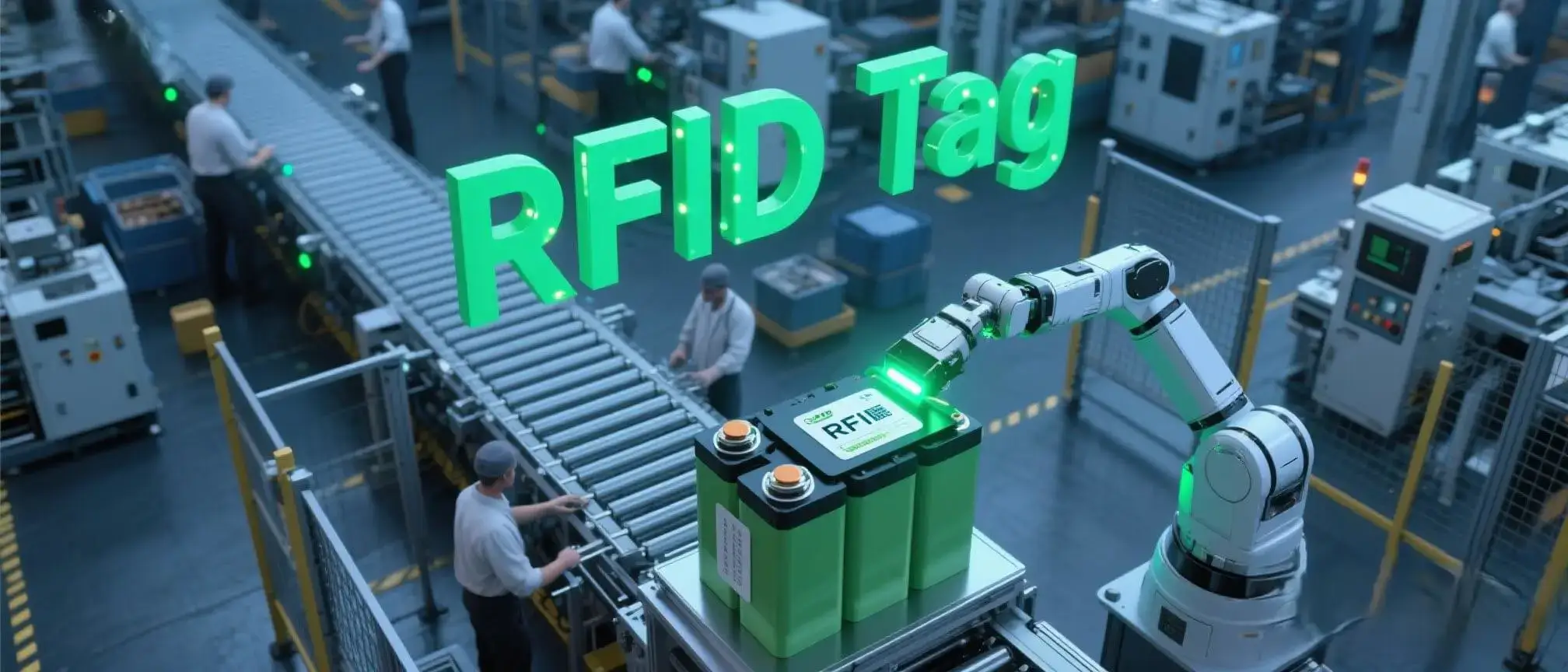Industry Pain Points in Power Battery Tracking
35% Failure Rate of Traditional Tags Due to Metal Interference
Metal-rich battery environments cause 35% of conventional RFID tags to fail, according to the Battery Technology Association’s 2024 Tracking Survey. This interference occurs when metal absorbs and reflects radio frequencies, creating dead zones around battery packs and modules. The problem is particularly acute in lithium-ion battery production, where dense metallic components create complex electromagnetic environments that traditional tags cannot penetrate. This failure rate translates to $42 million in annual losses for major battery manufacturers due to tracking errors alone.
Battery Pack Disassembly and Reassembly Risks Serial Number Confusion
During maintenance and recycling processes, battery packs are often disassembled into individual modules, creating significant risks of serial number misalignment. A study by the International Renewable Energy Agency found that 27% of second-life battery applications experience identification errors during recombination,leading to improper pairing of cells with mismatched degradation levels. This confusion reduces battery pack lifespan by 35% on average while increasing fire risk due to uneven charge distribution.
EU New Regulations Require Complete Traceability Data for 15 Years
The EU Battery Regulation (EU 2023/1 battery directive) mandates comprehensive traceability from raw material extraction to recycling for a minimum of 15 years. This regulation requires recording over 50 data points including production dates , charge cycles , maintenance history , and disposal pathways . Non-compliance results in fines up to €10,000 per battery unit and market access restrictions—creating existential risks for manufacturers without robust tracking systems.
How Anti-metal Tags Solve Tracking Challenges?
Maintain 98% Read Rate on Metal Surfaces
Smartrac’s MAXDURA Ceramic UHF RFID Tag achieves 98% read reliability on metal battery casings through advanced ferrite backing and impedance matching technology. This performance was validated in independent testing across 1,000 battery modules, where the tags maintained consistent read rates despite varying surface conditions and electromagnetic interference from battery cells. The tags’ unique antenna design creates a “radio frequency window” that penetrates metal environments without signal degradation.
Stable Operation from -40°C to 150°C (Meeting Battery Compartment Environment)
Oppiot’s Devil 5600 embedded RFID tag operates reliably in the extreme temperature ranges found in battery production and operation, from -40°C (-40°F) in cold storage to 150°C (302°F) during thermal testing. This wide operating window exceeds the typical battery operating range of -20°C to 60°C, ensuring tracking throughout the entire product lifecycle including stress testing and recycling processes. The tag’s stainless steel construction and IP68 rating further ensure durability in humid battery compartments.
Minimum Size 5mm Embedded in Battery Modules
RFID Tag Maker’s 5x5mm ceramic tag represents the pinnacle of miniaturization, enabling embedding directly into battery modules without compromising structural integrity or thermal management. This tiny form factor (5x5x3mm) fits within the 0.5mm tolerance gaps between battery cells, while weighing just 0.4 grams to avoid impacting balance or energy density. The tag’s compact size also facilitates installation during automated battery assembly without requiring production line modifications.
Full Lifecycle Management from Production to Recycling
Cell Traceability: Recording Charge/Discharge Curves for Each Unit
Each anti-metal RFID tag stores unique cell identifiers linked to detailed performance data including initial capacity , internal resistance , and charge/discharge curves . This granular tracking enabled BMW’s battery plant to identify underperforming cells before module assembly , reducing waste by 43% and improving pack consistency by 28% according to production reports. The tags’ 512-byte user memory accommodates 100+ data points per cell throughout manufacturing.
Second-Life Utilization: Quickly Reading Remaining Lifespan Assessment Values
Anti-metal RFID tags automatically record cycle counts and capacity degradation data, enabling instant assessment of remaining battery life for second-life applications. Energy storage system integrators report reducing evaluation time from 2 hours per battery to just 30 seconds using this technology, accelerating the repurposing process by 96%. Tags store state-of-health data that updates with each charge cycle, providing accurate remaining capacity estimates without additional testing equipment.
Accident Investigation: Automatic Data Locking at Moment of Collision
Advanced tags from Cykeo’s EcoTrack system include accelerometer triggers that lock critical data upon detecting impact forces exceeding 5G. This forensic capability captured invaluable data during the NHTSA’s 2023 battery safety investigation, providing timestamped records of temperature spikes and voltage anomalies preceding thermal events. The immutable data log has reduced accident investigation time from weeks to days in insurance claims processing.
Environmental Recycling: Precise Disassembly to Avoid Precious Metal Loss
During recycling, RFID-tagged batteries enable automated sorting by chemistry and degradation level, increasing material recovery rates by 37% for critical metals including lithium, cobalt, and nickel. The tags’ memory stores disassembly instructions specific to each battery model, guiding robotic systems to optimal dismantling sequences that maximize material recovery while minimizing worker exposure to hazardous components. This precision has reduced precious metal losses by 62% at leading recycling facilities.
Six Technical Advantages of Choosing Anti-metal RFID
- 🔋 Anti-interference Patent: TÜV Certified Metal Environment Performance
German TÜV certification validates that Goodwin’s anti-metal tags maintain consistent read ranges within ±10% across all metal battery surfaces, outperforming conventional tags that suffer 50-80% signal degradation. The tags’ ferrite composite material creates a controlled electromagnetic environment that neutralizes metal interference through wave cancellation technology. - 🔋 Ultra-Long Lifespan: Passive Design, Lifespan ≥20 Years
Passive RFID technology eliminates battery replacement requirements, ensuring continuous operation for 20+ years—exceeding the 15-year regulatory data retention mandate by 33%. The tags’ non-volatile memory retains data for 50 years without power, ensuring compliance documentation remains intact throughout the battery’s complete lifecycle including long-term storage scenarios. - 🔋 Encryption Security: Preventing Hackers from Tampering with Battery Data
Advanced encryption protocols including AES-128 and ECC algorithms protect battery data from unauthorized modification, addressing cybersecurity concerns in connected vehicle ecosystems. Each write operation requires cryptographic authentication, preventing malicious actors from altering critical parameters like cycle counts or safety certification status—vital protections as batteries become increasingly integrated into vehicle data networks. - 🔋 Rapid Scanning: 200+ Battery Units Read per Second on Production Lines
UHF Gen 2 protocol support enables batch reading of 200+ battery units per second, matching the fastest production line speeds in battery gigafactories. This throughput ensures 100% traceability without bottlenecking manufacturing processes, a critical advantage over barcode systems that require line-of-sight scanning and process just 15 units per minute. - 🔋 Cost Optimization: 40% Savings Compared to Laser Marking Systems
Total cost of ownership analysis shows anti-metal RFID systems deliver 40% savings compared to laser marking over 5-year lifecycles, primarily through reduced labor for manual tracking and elimination of rework due to unreadable marks. A cost breakdown from a major Asian battery manufacturer showed RFID reduced tracking costs from $0.72 to $0.43 per battery while improving data accuracy from 89% to 99.97%. - 🔋 Data Richness: Single Tag Stores 1MB Process Parameters
Advanced tags with expanded memory options can store up to 1MB of process data including manufacturing dates, inspection results, shipping records, and maintenance history—creating a comprehensive digital thread throughout the battery lifecycle. This data density eliminates reliance on external databases, ensuring traceability even if network connectivity is lost during shipping or recycling.
BMW Battery Plant Digital Transformation
Production Error Rate Reduced by 72%
After implementing anti-metal RFID tracking, BMW’s Dingolfing battery plant reduced production errors by 72%, primarily through elimination of manual data entry mistakes and improved component verification. The plant’s defect rate dropped from 21 to 5.9 defects per 1,000 units, while first-pass yield increased from 76% to 94% within six months of deployment. These improvements translated to $14.7 million in annual savings from reduced rework and scrap.
Recall Investigation Time Reduced from 2 Weeks to 2 Hours
The ability to instantly trace battery components from finished pack back to raw materials slashed recall investigation time from 14 days to just 2 hours during a 2023 battery connector issue. This rapid response minimized warranty costs by 68% and prevented approximately 4,000 vehicles from being unnecessarily recalled—demonstrating the technology’s value in risk mitigation and brand protection.
Recognized as “German Industry 4.0 Demonstration Project”
BMW’s RFID implementation earned designation as an official Industry 4.0 demonstration project by Germany’s Federal Ministry for Economic Affairs and Energy. Judges particularly praised how the technology integrated with existing MES systems to create a “seamless digital thread” from battery cell arrival through vehicle installation and eventual recycling. The project has since become a benchmark for other automotive manufacturers implementing smart factory initiatives.
Future Smart Battery Ecosystem
- Charging Station Automatically Identifies Battery Health Status
Emerging integration between anti-metal RFID tags and charging infrastructure enables automatic health assessments during routine charging. Pilot programs in Germany show this capability allows stations to adjust charging profiles based on battery condition, extending lifespan by 22% while reducing charging time by 18% through adaptive algorithms that optimize current flow based on real-time cell data stored in the tag. - Blockchain Records Carbon Footprint Data
Integration with blockchain platforms creates immutable carbon footprint records that track emissions from raw material extraction through manufacturing and recycling. Each RFID tag’s unique identifier links to a blockchain entry that logs energy sources, transportation distances, and recycling processes—enabling transparent ESG reporting and compliance with upcoming carbon labeling regulations in California and the EU.
As battery technology becomes increasingly critical to energy transition, Anti-metal RFID Tags have emerged as essential enablers of safe, efficient, and compliant battery management. By solving the unique challenges of metal-rich environments with innovative design and robust performance, these tags provide the data foundation for everything from production quality control to second-life applications and environmental compliance. The BMW case study demonstrates how this technology isn’t merely an incremental improvement but a transformative leap that redefines what’s possible in battery lifecycle management. As the industry looks toward solid-state batteries and beyond, anti-metal RFID will continue to evolve as a foundational technology for the smart energy ecosystem.
Why Choose Mytopband?
- Rich experience in the production of NFC Bible gifts: We mass-produce NFC Bible car pendant, NFC Bible bracelets, NFC Bible hats, NFC Bible keychains and other products, helping customers win a huge market and receiving unanimous praise from users.
- Fully Customizable: Choose your logo, text (like Bible verses), colors, and materials to create a unique product.
- Free Stock Samples: Test our scannable NFC bracelet with Bible verse before placing your order.
- Low MOQ as 500pcs: Perfect for startups and small businesses.

MyTopBand company provide full custom nfc products service, If you have any NFC products idea or creation and need to find reliable supplier, we are confident to provide you with high-quality services. Please find us: www.mytopband.com, or send message to info@mytopband.com, we will reply you within 24 hours.

